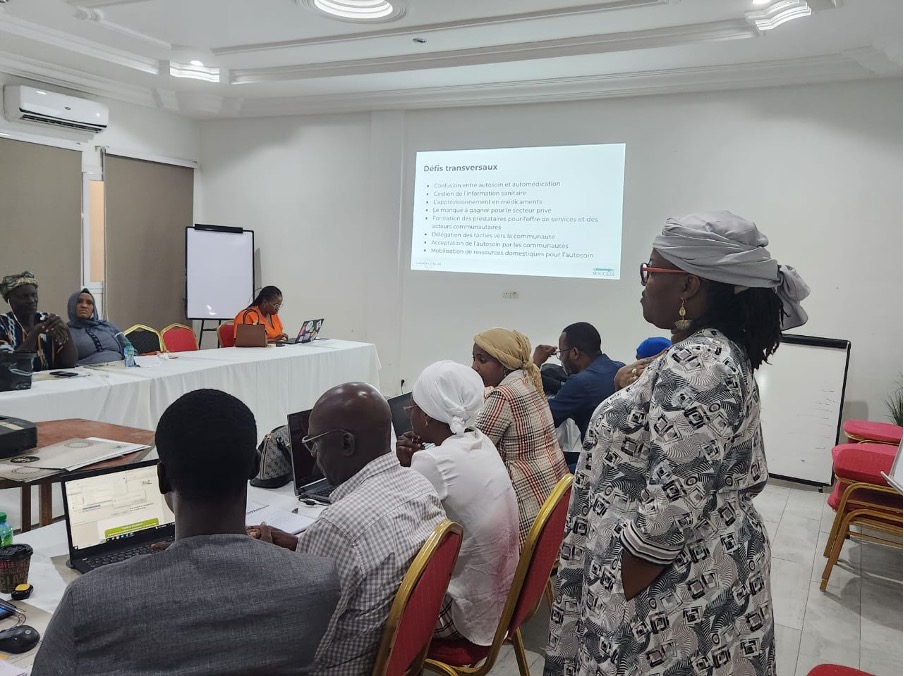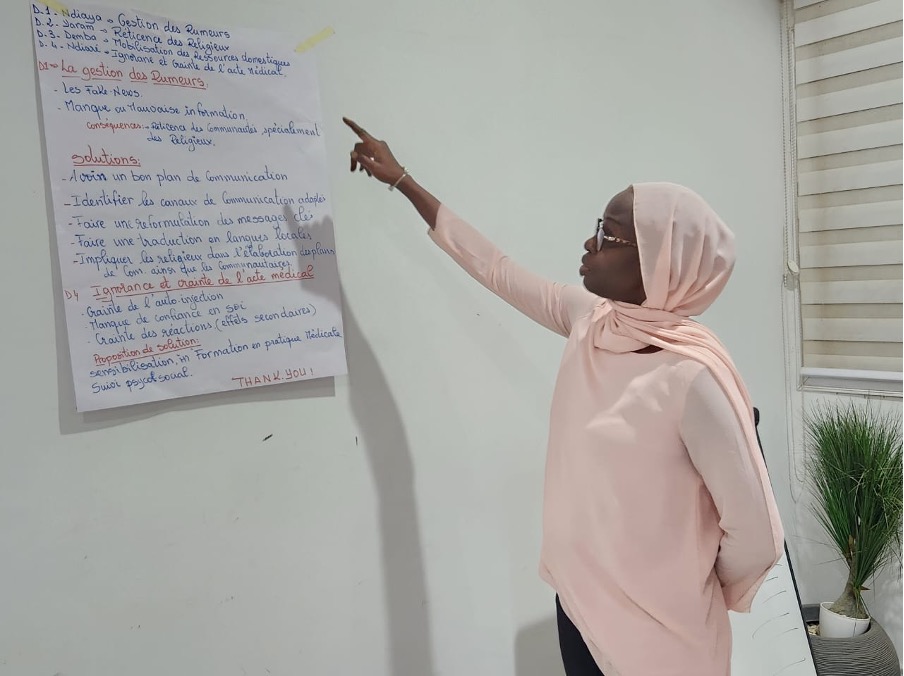Self-care Strategies Adapted to Strengthen Reproductive Health in Senegal

In Senegal, the health system is sometimes deficient due to poverty, economic inequality, socio-economic crises and political instability. Self-care strategies help to overcome the weaknesses of the health system in terms of human resources and accelerate efforts for universal access to care.
Self-care is defined by the World Health Organization as “the ability of individuals, families, and communities to promote their own health, prevent disease, maintain health, and to cope with illness and disability with or without the support of a health worker.” Self-care is a safe and promising strategy to ensure that populations are taking preventative measures, and are cared for early, efficiently and appropriately, using the right tools. For example, helping diabetics to inject themselves in the case of type 1 diabetes is a self-care practice.
Knowledge SUCCESS’s Learning Circles is a knowledge exchange activity that brings together groups of global health professionals to reflect on main success factors and challenges related to pressing topics, such as self-care.
In January 2024, Knowledge SUCCESS co-organized with PATH a three-day Learning Circles series in Thiès with family planning and reproductive health (FP/RH) professionals based in Senegal to explore what works and what doesn’t work in self-care interventions for advancing FP/RH. Twenty participants from Senegal and various sectors of the medical, community, youth, local partners, non-governmental organizations (NGOs), pioneer groups, civil society organizations (CSOs), community health workers attended the workshop.

WHAT WORKS?
Participants used the knowledge management techniques “Appreciative Inquiry” and “1-2-4 All” to identify the following key success factors for the practice of self-care for FP/RH in Senegal:
Key Success Factors
- Creating a group of self-care pioneers.
- Self-care guide drafted and validated in one year.
- Involving community members in developing the strategy.
- Institutional support from the Ministry of Health.
- Training health personnel.
- Multi-sectorality and diversity of players to support synergies.
- Awareness-raising and capacity-building at the community level.
- Advocacy for the promotion of DMPA-SC.
- Regulated legal framework in Senegal.
- Creation of a digital application for young people.

WHAT COULD BE IMPROVED?
Participants engaged in the knowledge management technique “Troika Consulting” to identify a challenge they had faced from their personal experience in implementing the self-care strategy in Senegal. Below are examples of those challenges and solutions proposed by other group members:
- Unavailability of a strategic self-care plan.
- Solutions:
- Draft the strategic plan with the pioneer group, local partners, local authorities, the institutional environment, NGOs, CSOs, community groups, etc.
- A 4 or 5-year strategic plan is needed, from which annual and quarterly action plans can be drawn up.
- Solutions:
- Lack of involvement of religious leaders in the strategy.
- Solutions:
- Include a sales pitch in the guide for religious leaders, enabling them to convey the right messages about FP/RH.
- Reformulation of key or sensitive messages.
- Solutions:
- Population reluctance to practice self-care.
- Solutions:
- Develop appropriate technical communication tools for reluctant populations.
- Provide training in medical practice and psychosocial follow-up
- Solutions:
- Some chronically ill people (TB, HIV, Hepatitis) no longer go to the facilities for their medication, due to lack of means or long distances.
- Solutions:
- Train community volunteers to dispense medicines (Badianou Gokh, teenage volunteers, peer educators).
- Strengthen the capacity of community health workers in drug distribution techniques.
- Solutions:
- Lack of funding for self-care, communication and advocacy activities
- Solutions:
- Advocate for funding from domestic resources.
- Engage the private sector in financing self-care programs through Corporate Social Responsibility (CSR).
- Local authorities can include a budget line in the annual budget for advocacy activities.
- Solutions:
- Lack of mobilization of domestic resources:
- Solutions:
- Financing by local authorities, involvement of young people in resource mobilization.
- Encourage local authorities (mayors) to get involved and decision-makers to understand the importance of self-care.
- Solutions:
- Scale up strategy in other regions, especially remote areas.
- Solutions:
- Extend implementation to the 12 other regions of Senegal.
- Solutions:
ACTION PLAN: COMMITMENT STATEMENTS
To conclude this forum for knowledge sharing and exchange, all participants drew up commitment statements on a specific action they planned to take as part of self-care to bring this strategy to fruition in Senegal. Below are the participants’ commitment statements:
- I commit to facilitating an update meeting with the departments of Disease Control, Maternal and Child Health, and Planning, Research and Statistics, and PATH/SOLTHIS on self-care.
- I undertake to give feedback on the workshop to the youth associations.
- I undertake to share my experience of self-care at a meeting of the pioneer group.
- I undertake to report on this workshop to my organization and to participate in the drafting of the national strategic plan for the self-care strategy in Senegal.
- I undertake to hold 4 “Troika” dissemination sessions with the CFJ/CCA on self-care for reproductive health.
- I undertake to integrate the Learning Circles approach into our organization’s capacity-building plan.
- I undertake to organize workshops to draw up a strategic plan on self-care.
- I commit to sharing with the Badianou Gokh community and disabled people.
- I undertake to meet with the deputy mayors to discuss advocacy prospects with local authorities.
- I undertake to organize a meeting to launch the “Woman of Light for Self-Care” concept.
- I undertake to share the outputs of this workshop with the Maternal and Child Health/Family Planning departments for a better appropriation of the self-care concept.
- I undertake to share the workshop with my organization, the national network of people living with HIV.
- I undertake to follow up the workshop by organizing a “Troika Consulting” session with young leaders and CSOs on access to FP/RH services for young adolescents.
- I undertake to involve religious leaders in the strategy.
- I undertake to advocate self-care to ensure that the concept is understood every time I give a talk on human rights.
- I pledge that access to healthcare is a right for all, and that self-care can help relieve overcrowding in health facilities.

CONCLUSION
Thanks to Learning Circles, this group of FP/RH professionals from Senegal was able to increase their knowledge and understanding of self-care issues, establish networks and relationships with colleagues facing similar challenges, and generate new ideas and practical solutions to improve the implementation of FP/RH programs. The new knowledge management tools and techniques used in this training will be useful in their organizations and day-to-day work, and they will be able to implement these approaches in future knowledge sharing activities.
Love this article and want to bookmark it for easy access later?




